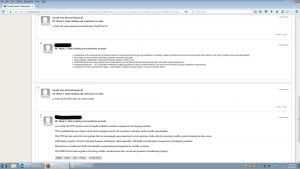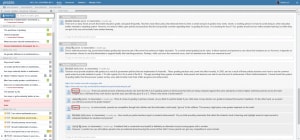Online discussion boards, whether those that come as part of Blackboard/Canvas or come from an external provider, are a great way to engage your students outside of class. Q&As, lively debates, assessment clarifications – we’ve previously covered ways to use discussion boards and tips and tricks that you can use to engage students on them. But what about engaging the wider community, or having students collaboratively note-take using discussion boards? Read on to find out how two Sydney academics achieved this in their units.
Collaborative notetaking in ECOP1003
In tutorials, it’s often difficult to engage students in productive, structured discussions, and even harder for students to focus on recording the outcomes of discussions while contributing meaningfully. Gareth Bryant from the Department of Political Economy coordinates ECOP1003 International Economy and Finance, a second-semester first-year unit, and used the humble LMS-based discussion forum in an innovative way to promote student participation and collaboration.

Following weekly lectures, tutorials in ECOP1003 are organised around set questions designed to engender debate and discussion about international trade, production and finance. To assist with this, Gareth used Blackboard’s discussion boards to create a space for collective notetaking by tutorial groups. He started a new thread for each tutorial and posted tutorial discussion questions individually within each thread. He then duplicated this forum for each tutorial group, and students had access to forums for all tutorial groups.
Most tutorials began by dividing the questions between small groups. Each small group would have a nominated note taker who would post a summary of the group’s discussion as a reply to the relevant question in their Blackboard tutorial group forum before the end of tutorial. Students had the option of posting anonymously if they wished because they were posting on behalf of their small group.
Gareth observed a number of advantages of this method:
- Having one nominated note taker allowed the majority of students to simply engage in tutorial discussion without being distracted by their computers.
- The collective nature of the note taking encouraged more focused, structured and cooperative responses to tutorial questions.
- It helped make clear the connection between tutorials and assessment tasks, as the collective notes could be used when studying for exams, which drew on tutorial content extensively.
Engaging the wider community in EDUP4081
A common conundrum facing coordinators trying to bring authenticity into their classrooms rests around bringing members of the community together with students. How do you expose students to these authentic voices in an efficient and cost-effective way that is safe for all stakeholders? Heather McMaster from the Sydney School of Education and Social Work wanted to engage her own students with parents and teachers who work with primary school mathematics students to discuss controversial topics such as online teaching, numeric grading, and homework.
Working with these controversial issues formed part of the assessment for the unit. Small groups of students had to facilitate an in-class forum on a particular issue (such as holding a mock staff meeting, staff-parent meeting, or run a Q&A-like debate), which meant that groups had to draw from a diverse range of perspectives. The engagement with parents and teacher voices from the community was crucial to informing their preparation.

Heather leveraged the ability of Piazza, a free third-party discussion platform that can be integrated into Blackboard/Canvas, to drive her discussion board and allow members of the community to interact with students. Teachers can request to have a ‘domain lock’ removed from their particular Piazza forum so that email addresses outside the sydney.edu.au domain can also register to participate in that Piazza forum. Heather used this to allow parents and primary school teachers to access the forum and discuss critical issues with students – ensuring that everyone posted anonymously to protect identities.
Using discussion forums this way allowed Heather’s students to gather authentic opinions and experiences from the wider community to inform their own development as teachers.
Tell me more!
- Check out the Teaching Insight on strategies for effective use of discussion forums





